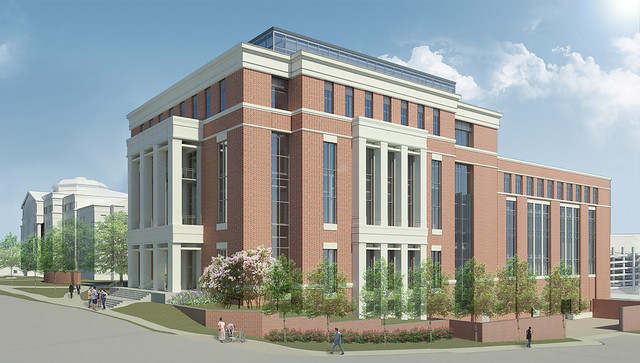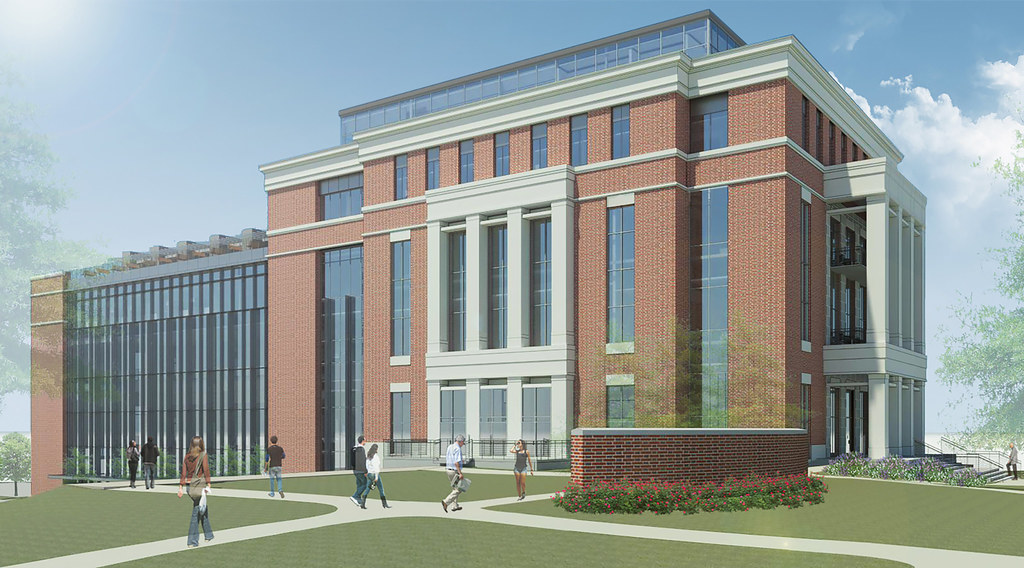Auburn University’s Raymond J. Harbert College of Business breaking ground on $40 million facility
Article body
Fifty years after Auburn University founded a school of business, the Raymond J. Harbert College of Business will celebrate the groundbreaking of a facility that will play a vital role in its future growth.
The college will host a groundbreaking ceremony Friday, April 7, at 2 p.m. for a second building that will house graduate programs and classroom and meeting spaces for undergraduate and graduate students. The event is open to the public.
A $15 million lead gift from 1982 alumnus Raymond J. Harbert will help fund the $40 million facility. The five-story building will feature nearly 100,000 square feet of classroom and meeting space. Auburn University’s Board of Trustees approved the project in September 2016.
Lowder Hall will remain the administrative hub of the Harbert College, but the second facility will address needs that did not exist when Lowder Hall opened in 1992.
"We have been clear about our vision of becoming an elite public school of business," said Harbert College of Business Dean and Wells Fargo Professor Bill Hardgrave. "This new facility will enable us to deliver on our promise of providing a superior student experience in new ways. We will be able to provide more collaborative learning environments for our students and we will be better able to respond to changes in technology or classroom best practices that can be easily adjusted or modified to fit a variety of needs.
"It’s fitting that we will celebrate the groundbreaking as we mark our 50th year as a school of business. This new building marks a milestone for us, and will certainly strengthen our ability to serve our students."
The ceremonial groundbreaking will take place near the corner of South Donahue Drive and West Magnolia Avenue. The new building will sharpen the vision for a "business campus" at that intersection. An outdoor courtyard and greenspace will connect the graduate building and Lowder Hall. Plans for the facility include an "Innovation Lab" for project teams, breakout rooms for collaborative projects, several adaptable classroom spaces with moveable furniture and walls, an auditorium with adjustable seating configurations, an outdoor terrace and an executive board room. The college will explore naming opportunities for classrooms and other spaces.
The bid process for the construction project has yet to open. Birmingham-based William Blackstock Architects has developed renderings for the facility.
Harbert and his wife, Kathryn Dunn Harbert, a 1981 Auburn alumna, are responsible for two of the four largest gifts in university history. Harbert, CEO of Harbert Management Corporation, a Birmingham-based independent investment management firm, made a $40 million commitment to the college in June 2013 that led to its naming. The gift supported the creation of endowed chair and eminent scholar positions to assist in recruitment and retention of top faculty, the formation of the Center for Supply Chain Innovation, the formation of a doctoral program and finance and other programmatic improvements.
The Harberts serve as co-chairs of Because This is Auburn – A Campaign for Auburn University. In his professional role with Harbert Management Corporation, Harbert leads a firm that manages more than $4.4 billion in assets sourced globally from high net-worth individuals and families, financial institutions, pension funds, foundations, endowments and sovereign wealth funds.
Related Media
Media interested in this story can contact Communications Director Preston Sparks at (334) 844-9999 or preston.sparks@auburn.edu.
Auburn University is a nationally ranked land grant institution recognized for its commitment to world-class scholarship, interdisciplinary research with an elite, top-tier Carnegie R1 classification, life-changing outreach with Carnegie’s Community Engagement designation and an undergraduate education experience second to none. Auburn is home to more than 30,000 students, and its faculty and research partners collaborate to develop and deliver meaningful scholarship, science and technology-based advancements that meet pressing regional, national and global needs. Auburn’s commitment to active student engagement, professional success and public/private partnership drives a growing reputation for outreach and extension that delivers broad economic, health and societal impact.






